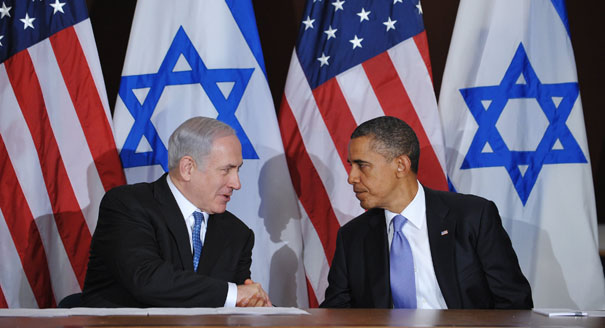Ariel (Eli) Levite, Toby Dalton
{
"authors": [
"Ariel (Eli) Levite"
],
"type": "legacyinthemedia",
"centerAffiliationAll": "",
"centers": [
"Carnegie Endowment for International Peace"
],
"collections": [],
"englishNewsletterAll": "",
"nonEnglishNewsletterAll": "",
"primaryCenter": "Carnegie Endowment for International Peace",
"programAffiliation": "",
"programs": [],
"projects": [],
"regions": [
"North America",
"United States",
"Middle East",
"Israel"
],
"topics": [
"Nuclear Policy"
]
}
Source: Getty
U.S.-Israel Relations in the Aftermath of the Elections
With Israeli elections two months away and Obama's second term administration barely beginning to take shape, key factors affecting the bilateral relationship remain highly uncertain.
Source: Atlantisch Perspectief

Continuity Amidst Challenges
Notwithstanding who ends up sitting in the leader’s chair in the Israeli Prime Minister’s office come 2013, a few things seem clear. The U.S. and Israel have strong common interests in the Middle East and selectively beyond it as well. Moreover, broad and deep-rooted social, cultural, and even religious bonds lubricate the relationship between the two countries and even more importantly between their peoples. These are bound to remain largely unchanged for at least the next decade even if domestic, especially demographic, transformations on both ends could produce meaningful changes in the relationship over the longer term. The U.S. and Israel will remain close allies even if at times their relationship experiences some strains and the personal chemistry between their leaders may leave something to be desired.
Additionally, the two countries will in all likelihood sustain their intimate collaboration across a broad range of domains. The U.S. will continue to be Israel’s pre-eminent foreign ally. And American preferences will continue to weigh especially heavily on Israeli decision-making. So for the foreseeable future both countries should continue to have a disproportionate impact on each other’s policies in certain key areas, first and foremost security. And the domestic and foreign policies of both nations should continue to be closely interwoven in most areas related to the bilateral relationship. Such intimacy, as we all know from our personal lives, typically is a recipe for both collaboration and occasional friction.So at the most fundamental level continuity and cooperation can be expected to remain the name of the game for U.S.-Israeli relations well into the future. Early developments after the Obama re-election, such as the bilateral cooperation effective during the brief Gaza air operation and the Palestinian bid for statehood at the UNGA in November 2012 reaffirm this assessment. At the same time the personal chemistry between U.S. President Obama and the next Israeli Prime Minister might prove less than ideal, certainly if Prime Minister Netanyahu were also to be re-elected. It might make the day-to-day management of the relationship more challenging, especially given the delicate nature of issues that are likely to dominate the bilateral agenda early in the second terms of both leaders.
Leaving aside the personal dimension of the leadership relations and the toll that could be exacted by accidents and other random events (which in the Middle East should never be discounted), Iran and its nuclear program (and potentially NPT-inspired related efforts to promote a WMD disarmament process in the Middle East) promises to be the number one challenge for the bilateral relationship in 2013. Palestinian matters (ranging from peacemaking to West Bank settlement expansion, and from settlers’ activities to the fraying of the Palestinian authority) are in turn likely to be a very close runner up. The two issues might even be interconnected in various ways. Additional issues that could impose themselves on the bilateral agenda and cause some friction therein involve disagreements over the responses to regional development ranging from matters that are general and political in nature (say, regarding the policy toward political Islam and its rise to power in Egypt and perhaps elsewhere in the region before too long) to concrete and acute concerns posing immediate threats to Israel. The latter could include ominous developments following the disintegration and eventual collapse of the Assad regime in Syria and its aftershocks in Lebanon, friction with Hamas and other factions in the Gaza strip, lawlessness in the Sinai Peninsula, and even possible upheaval in Jordan.
Shared Goals But Potentially Conflicting Tactics
It seems highly unlikely that early in his second term President Obama would voluntarily devote a big share of his precious time to foreign policy generally and to the Middle East in particular. True, every U.S. president, especially in his second and last term, is eager to leave his imprint on history, not in the least on the world stage. Moreover, personally President Obama undoubtedly cares about the relationship between the U.S. and the Muslim world, worries about the prospects of a nuclear Iran which he is determined to stop, and is highly motivated to see progress on the Israeli-Palestinian front. But he faces an overwhelming American domestic agenda. And after his traumatic experience in his first term he is undoubtedly also painfully aware of the exceptional challenges hampering quick progress in settling Middle East disputes, all the more so since the Arab Spring. Taken together these constraints are bound to sustain at least for a while the timidity and humility that have characterized Obama’s Middle East policy since his second year in office. His policy toward the region, certainly early in the second term, is thus most likely to manifest great caution and an ad hoc approach, largely eschewing a grand design for the region. It would confine the U.S. role mostly to routine diplomacy and crisis management unless either a golden opportunity for rapid progress presents itself or an exceptional crisis imposes itself on the U.S.
The preference to avoid a massive and sustained U.S.-led intervention in any one of the numerous crises in the region notwithstanding, both the Palestinian and Iranian issues seem certain to draw the U.S. in early in the second term, most probably in the first half of 2013. And these in turn might ultimately become impossible to manage without broadening the scope of the engagement toward a Middle East regional initiative. In any event, both issues have profound implications for the bilateral U.S. ties with Israel. Importantly, in both cases the U.S. and Israel see eye to eye on the goals: to prevent Iran from acquiring nuclear weapons, on the one hand, and avert a collapse of the Palestinian Authority and sustain its security collaboration with Israel, on the other. So they hold promise for intimate U.S.-Israeli collaboration in the pursuit of these common goals, very much along the lines of the process to date.
Yet some of the means the U.S. is likely to employ toward these ends - diplomatic negotiations with Iran and renewed pressure on Israeli settlement activity and down the road perhaps also on the contours of its permanent settlement with the Palestinians - could, as before, become a bone of contention between the two governments. These disagreements could certainly spill over into the public domain and even play out on Capitol Hill. But bruising as they might initially seem, in all likelihood they should ultimately prove perfectly manageable, except if it were to turn out that the U.S. manifests impatience or insensitivity toward fundamental Israeli concerns or that the Israeli government resists U.S. pressure because it is inextricably beholden to hawkish domestic interest groups.
Natural disagreements between the U.S. and Israel over policy and tactics in these two areas could become clouds overshadowing the bilateral relationship only if it were to turn out (which I consider quite unlikely) that the U.S. would be willing to settle for a nuclear stalemate with Iran or accept what Israel deems to be a badly flawed deal with Iran. The flaws in such deal could manifest themselves in what the U.S. would be willing to settle for as nuclear restraint from Iran as well as in what it might be willing to offer Iran in return in general and in “Israeli currency” in particular. Additional trouble on this front could emerge in the absence of a deal if it were to turn out that the U.S. is unwilling to take more drastic action against unchecked, continuing Iranian enrichment and other forms of a march toward nuclear weapons or refuses to go along with unilateral Israeli action against Iran under such a scenario, all the more so if the U.S. is then drawn into the conflict.
Similar prospects for serious deterioration in the bilateral relationship are possible (though with equally low likelihood) in response to two clusters of developments on the Palestinian front (both perhaps not unrelated to the developments on the Iranian front). One is in response to an unlikely but not impossible premeditated policy of annexation of the West Bank or unbridled settlers’ activity toward the Palestinian population after the coming Israeli elections or in response to Palestinian violence (a new Intifada) and perhaps even the collapse of the Palestinian Authority. The other is in response to the U.S. applying pressure on Israel to make serious unilateral concessions toward the Palestinian Authority that are not matched by Palestinian or Arab ones or inordinately push Israel to make risky and contentious compromises on issues of borders, refugees and Jerusalem. Both of these extreme scenarios seem like a sure recipe for damaging the bilateral relationship. And they might trigger defiant Israeli actions not only in defense of its core national interests but possibly also as an extension of the ideology and political preferences of its leadership of the day. This holds especially true if the Israeli government were to be led by, as is presently widely expected, a right-of-center coalition.
The Outliers
Many other Middle East issues seem ripe for close bilateral U.S.-Israel cooperation and perhaps also for broader cooperation with several other U.S. allies as well. This is not only because the U.S. and Israeli goals in these areas converge, but the respective tactics applied by both states to handle them also seem compatible. Moreover, most of these issues also lack for either or both parties the same saliency and political sensitivity (in both countries) that characterize the more contentious concerns above. For example, both Israel and the U.S. are eager to prevent a rollback of the Egyptian-Israeli peace treaty or any deterioration of the security situation in the Sinai Peninsula. And both seem equally resolved to primarily employ diplomatic, economic, and other - low profile - means to attain these goals. The same applies for the aim of dissuading and if need be preventing Syrian use of chemical weapons, deterring Hezbollah and Hamas from sustained aggression against Israel or working diligently to prevent a collapse of the Hashemite monarchy in Jordan.
Israel might sometimes show signs of frustration with occasional U.S. timidity, hesitancy, or slowness in responding to deteriorating conditions on all of these fronts, probably because the U.S. would factor in additional and different considerations that will hold it back from lending Israel the unequivocal support in crisis that Israel yearns for on issues it feels could have a much more profound bearing on its security than on core U.S. interests. Israeli anxiety under such circumstances might propel Israel to take decisive unilateral action to protect its territory and population, at times to the chagrin of the U.S. Yet in the final analysis it is hard to imagine a serious wedge being driven between the U.S and Israel by any of these issues because the bonds between the two nations fundamentally run so deep.
This is not to suggest that there are no issues on which U.S. and Israeli policies will not only differ greatly but may even run at cross purposes. It is easy to envisage a whole slew of such issues, especially of a regional Middle East nature, and their number and saliency is actually on the rise since the unraveling of the peace process and even more so since the onset of the Arab Spring. The handling of political Islam throughout the region and dealing with Erdogan’s Turkey and supplies to the Arab countries, commonly known in the bilateral parlance context as qualitative-military-edge issues, are just a few cases in point. But then such a situation is hardly unique to U.S.-Israeli ties and commonly affects even the relations among the closest of allies, all the more so in an international and regional system characterized by so much volatility, complexity, and uncertainty. This inevitably brings us back to the question of how skillfully the leaders of both nations can navigate their bilateral relations in the coming year, especially when their personal chemistry leaves a lot to be desired. A clear answer to this question remains for now in the realm of the imponderables.
This article was originally published in Atlantisch Perspectief.
About the Author

Senior Fellow, Nuclear Policy Program, Technology and International Affairs Program
Levite was the principal deputy director general for policy at the Israeli Atomic Energy Commission from 2002 to 2007.
- Promoting Responsible Nuclear Energy Conduct: An Agenda for International CooperationArticle
- Unpacking Trump’s National Security StrategyOther
- +18
James M. Acton, Saskia Brechenmacher, Cecily Brewer, …
Recent Work
Carnegie does not take institutional positions on public policy issues; the views represented herein are those of the author(s) and do not necessarily reflect the views of Carnegie, its staff, or its trustees.
More Work from Carnegie Endowment for International Peace
- Iran Is Pushing Its Neighbors Toward the United StatesCommentary
Tehran’s attacks are reshaping the security situation in the Middle East—and forcing the region’s clock to tick backward once again.
Amr Hamzawy
- The Gulf Monarchies Are Caught Between Iran’s Desperation and the U.S.’s RecklessnessCommentary
Only collective security can protect fragile economic models.
Andrew Leber
- Duqm at the Crossroads: Oman’s Strategic Port and Its Role in Vision 2040Commentary
In a volatile Middle East, the Omani port of Duqm offers stability, neutrality, and opportunity. Could this hidden port become the ultimate safe harbor for global trade?
Giorgio Cafiero, Samuel Ramani
- Europe on Iran: Gone with the WindCommentary
Europe’s reaction to the war in Iran has been disunited and meek, a far cry from its previously leading role in diplomacy with Tehran. To avoid being condemned to the sidelines while escalation continues, Brussels needs to stand up for international law.
Pierre Vimont
- Lessons Learned from the Biden Administration’s Initial Efforts on Climate MigrationArticle
In 2021, the U.S. government began to consider how to address climate migration. The outcomes of that process offer useful takeaways for other governments.
Jennifer DeCesaro












